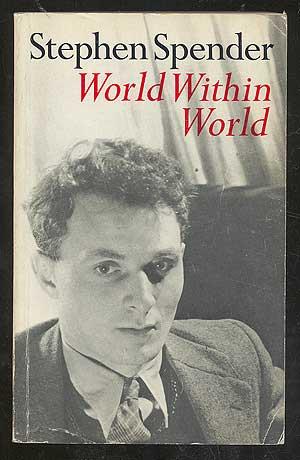
Prior to picking up his only memoir, World Within World, I had little prior exposure to Stephen Spender. I knew him to be a poet, probably from some anthology I read as a teenager, but could not have named even one of his poems. If I purchased the book on such flimsy pretexts, I began to read it out of the promised “vivid portraits” it contained of important 20th century writers: T.S. Eliot, Virginia Woolf, W.H. Auden and Christopher Isherwood, all of whom Spender knew personally. There is even a brief and comical encounter with W.B. Yeats, near the very end of the great man’s life. But as rewarding as each of these episodes was, the totality of the work, with its insights into the pre- and post-war mindset of European artists, say, or its charting of Spender’s own artistic development, was far more captivating.
We begin in childhood, as memoirs tend to do, but there is something almost perfunctory in Spender’s descriptions of this period. “We lived in a style of austere comfort against a background of calamity,” he tells us. His mother was a “semi-invalid,” almost from birth, and one of the inescapable anxieties of his home life was disturbing her rest with the kind of boyish rambunctiousness other children might take for granted.
Once, when we had been playing trains in the nursery, which was above her bedroom, the door suddenly opened and she appeared on the threshold with a white face of Greek tragedy, and exclaimed like Medea: ‘I now know the sorrow of having borne children.’
Under better circumstances, when not confined to her bed, Spender’s mother can be companionable, even sweet, with a lively intelligence that her son clearly inherited, but even these periods of happiness were eclipsed, in her children’s minds, by the storms of her temper.
She was hysterical, and given to showing violent loves and hates, enthusiasms and disappointments, which went to make us feel that our family life was acted out before a screen dividing us from an outer darkness of weeping and gnashing of teeth, immense rewards and fearful punishments.
Spender’s father, who seems to merit less description, rivals his wife for melodrama, though in both cases their influence upon their children was fatally cut short: Spender’s mother died when he was 12 and his father when he was just 17. Far more time is given to descriptions of boarding school, the University College School, and later university, University College, Oxford, where a budding friendship – or perhaps, more accurately, an apprenticeship – with W.H. Auden transforms Spender’s life. Auden, it seems, was already a literary prodigy even in university, accustomed to receiving younger, aspiring writers and poets hopeful of receiving his guidance and criticism.
Calling on Auden was a serious business. One made an appointment. If one arrived early one was liable to find the heavy outer door of his room, called ‘the oak,’ sported as a sign that he was not to be disturbed. When with him, one was liable to be dismissed suddenly and told the interview was at an end.
After a few such private consultations with Auden and much sharing of poems, Spender wonders aloud whether or not he might be better suited for prose. “You must write nothing but poetry,” Auden tell him, “we do not want to lose you for poetry.” A compliment, a moment of hope?
‘But do you really think I am any good?’ ‘Of course,’ he replied frigidly. ‘But why?’ ‘Because you are so infinitely capable of being humiliated. Art is born of humiliation,’ he added in his icy voice – and left me wondering when he could be humiliated.
Auden’s point, however poor his bedside manner, is well-taken: writing is a humiliating craft, a perpetual stumbling over words and phrases, and nothing but persistence in the face of one’s own manifest inadequacy could yield the polished perfection of a good poem.
Another captivating aspect of World Within World has to do with the political landscape of the 1930s, which Spender – as a young artist, a budding socialist, and a frequent traveler to Germany – chronicles with admirable detail. He begins his visits to Germany with a good deal of optimism, convinced he is breathing freer, more tolerant air than in his native Britain. Germany, it seems to Spender, is a never-ending party, a bacchanal by night and nude sunbathing by day. Writers and artists pushed back against conventional boundaries of taste and convention; the German night life catered to every whim and fancy and erotic desire. Gradually, however, it dawns on him that beneath the pleasant exterior hides a darker reality:
Berlin was the tension, the poverty, the anger, the prostitution, the hope and despair thrown out on to the streets. It was the blatant rich at the smart restaurants, the prostitutes in army top boots at corners, the grim, submerged-looking Communists in processions, and the violent youths who suddenly emerged from nowhere into the Wittembergplatz and shouted: ‘Deutschland Erwache!’
In one memorable scene, while he is soaking up the noon sun amongst a crowd of nude sunbathers, the peaceful day is disturbed by a distant sound: future brownshirts marching and drilling in the nearby forest.
Spender’s memoir never seems to settle on a single subject, variously offering us commentary on politics and poetry, portraits of famous writers and thinkers, and intimate insights into his own life and relationships, including a failed marriage. But these changes are never so abrupt or disorienting as to detract from our enjoyment or the pleasures of his company, chief among which is an encounter with a mind deeply engaged with his times.